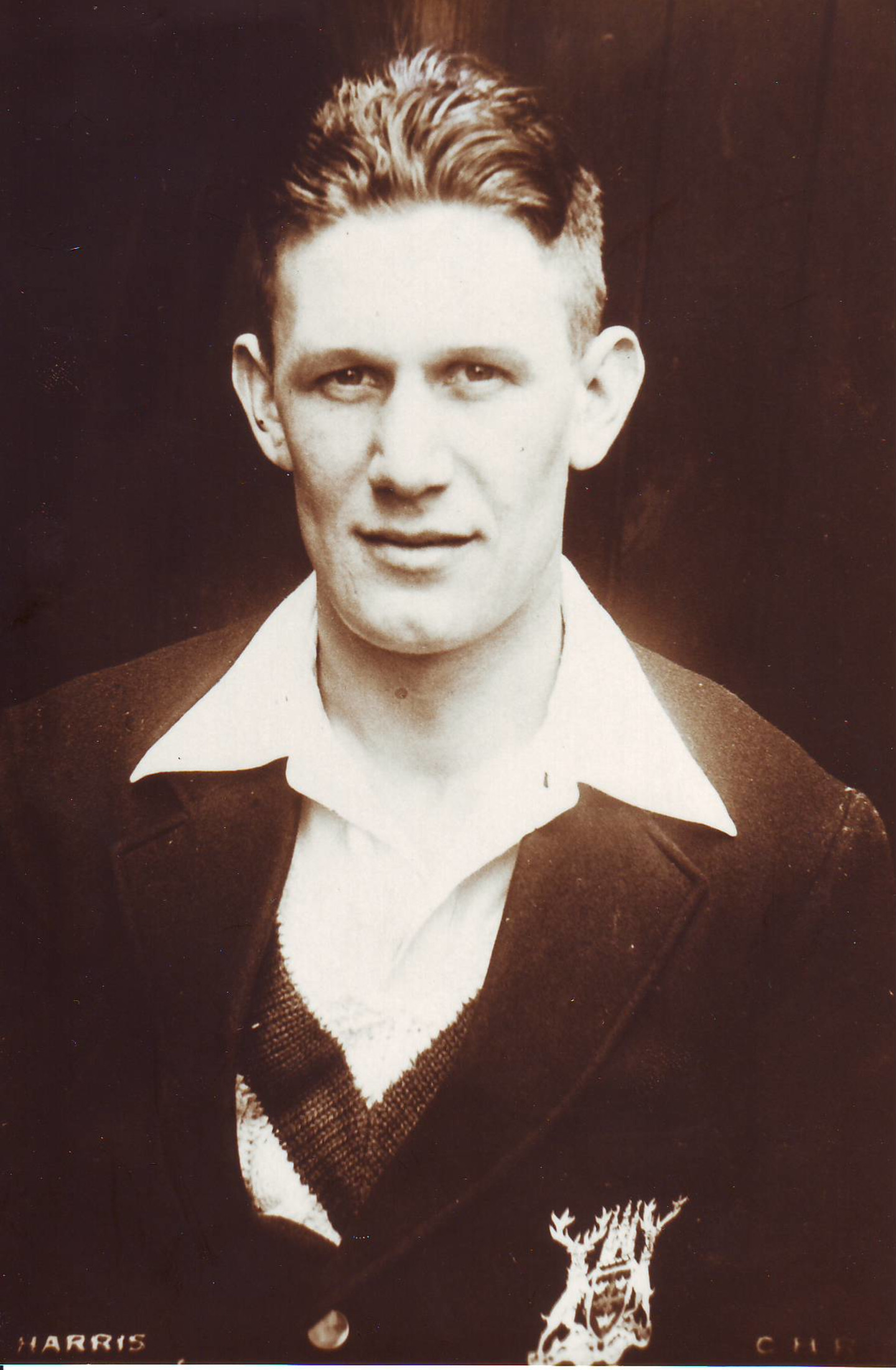Born in Underwood on 6 December 1908, Charles Bowmar Harris was a right hand batsman and right-arm medium-pace bowler.
In August 1924 he accepted an offer to join the Trent Bridge ground staff for the following season, in which he appeared twice for the Second XI, making a modest 13 runs in 4 innings. In 1926 and 1927 however, he was a regular member of the side and performed usefully, if not spectacularly. Two centuries for the Seconds, plus 15 wickets at 15 runs each, in 1928 led to his baptism in First-Class cricket.
The Nottingham Journal wrote: 'When on Saturday I arrived at Trent Bridge for the Yorkshire match, I found the Nottinghamshire team selectors in difficulties, for with only five minutes or so remaining before the start of play, they were still concerned with the problem of choosing the side. Larwood, Staples and Gunn, it appeared, were all on the injured list and unable to play. Payton and Keeton were still unfit and the services of Matthews were also unavailable." Despite this terribly weak position Nottinghamshire managed to draw the match; Harris, coming in at No 8, made 6 not out. His only other game of 1928 was the final match at Cardiff when he replaced Sam Staples who had sciatica.
In the Championship season of 1929, Harris made a solitary appearance but failed to score and in 1930 his efforts were entirely confined to the Second team, though he was also playing for Gainsborough Britannia in the Bassetlaw League.
His re-introduction into the county side in 1931 was almost a carbon copy of his 1928 debut as Larwood, Sam and Arthur Staples and Voce were all injured when the County faced Yorkshire at Trent Bridge. Harris was awarded his county cap on 22 August 1931 and celebrated with a score of 64, his highest at that point.
Charlie Harris's now famous partnership with Walter Keeton began in 1932 - they opened together for the first time in the second innings of the first game of the campaign versus Sussex. When George Gunn suffered injury in the second game, Harris slipped into his place as Keeton's permanent partner; they would go on to make 45 three-figure opening stands.
It was not until June 1933 that Harris scored his first hundred in important cricket. He chose a suitable occasion for this milestone, the Whitsuntide match against Surrey, making 132 out of 267 in front of a crowd of 11,000.
Harris would make 150 or more for Nottinghamshire on five occasions: 234 v Middlesex (Trent Bridge, 1933), 153 v Essex (Trent Bridge, 1934), 179 v Surrey (The Oval, 1938), 196 v Essex (Trent Bridge, 1939), and 239* v Hampshire (Trent Bridge, 1950).
He failed to score a century in 1935 yet still scored 1,700 runs with an average of 37.15; six others made 1,000 that year without a century, but all had averages under 30. Keeton was absent for half the summer, so that Harris's utter dependability was of even more value to the team.
The war found Harris playing for Yeadon, with considerable success, in the Bradford League and in 1946 he returned to Trent Bridge staff. The first post-war summer was a poor batting one for Nottinghamshire, who relied heavily on Keeton and Harris for runs, which the partnership duly produced.
Illness reduced Harris' cricket in 1947 and in August he was forced to undergo an operation. In 1948 he again missed several matches and his best innings was 146 v Glamorgan.
Against Worcetershire that season, he surprised everyone by coming on as a fourth change bowler and taking 5 wickets for 19 - bowling which had been almost dormant for a decade and a half came briefly back into the headlines.
During 1949, Simpson took over as Keeton's opening partner and Harris generally came at no 5, illness again prevented him from appearing in several matches. In 1950, his last full year, he saved the side versus Somerset at Weston. Three wickets had gone for 15 when Harris arrived to make 88 in a stay of 190 minutes. His greatest innings was against Hampshire when he was restored to open the innings and carried his bat out of the highest total of his career - 239no, the next best innings was 48.
His final First-Class match for Nottinghamshire was against Hampshire at Trent Bridge in July 1951. He scored 18,823 First-Class runs in 362 games for Nottinghamshire. He also took 196 wickets at an average of 42.83.
In August 1951, the Club offered Harris £300 to terminate his contract, which had a year to run, this he agreed to do and in 1952 he was engaged by the West of Scotland Club. In 1953 ill health forced him to retire from active cricket and in 1954 he appeared on the First-Class umpire's list, but illness compelled him to resign after four matches.
Charlie Harris died in Nottingham on 8 August, 1954. One of the most cheerful and companionable of cricketers, his loss a the early age of 45 was deeply mourned.
April 2020
Nottinghamshire First-Class Number: 339
